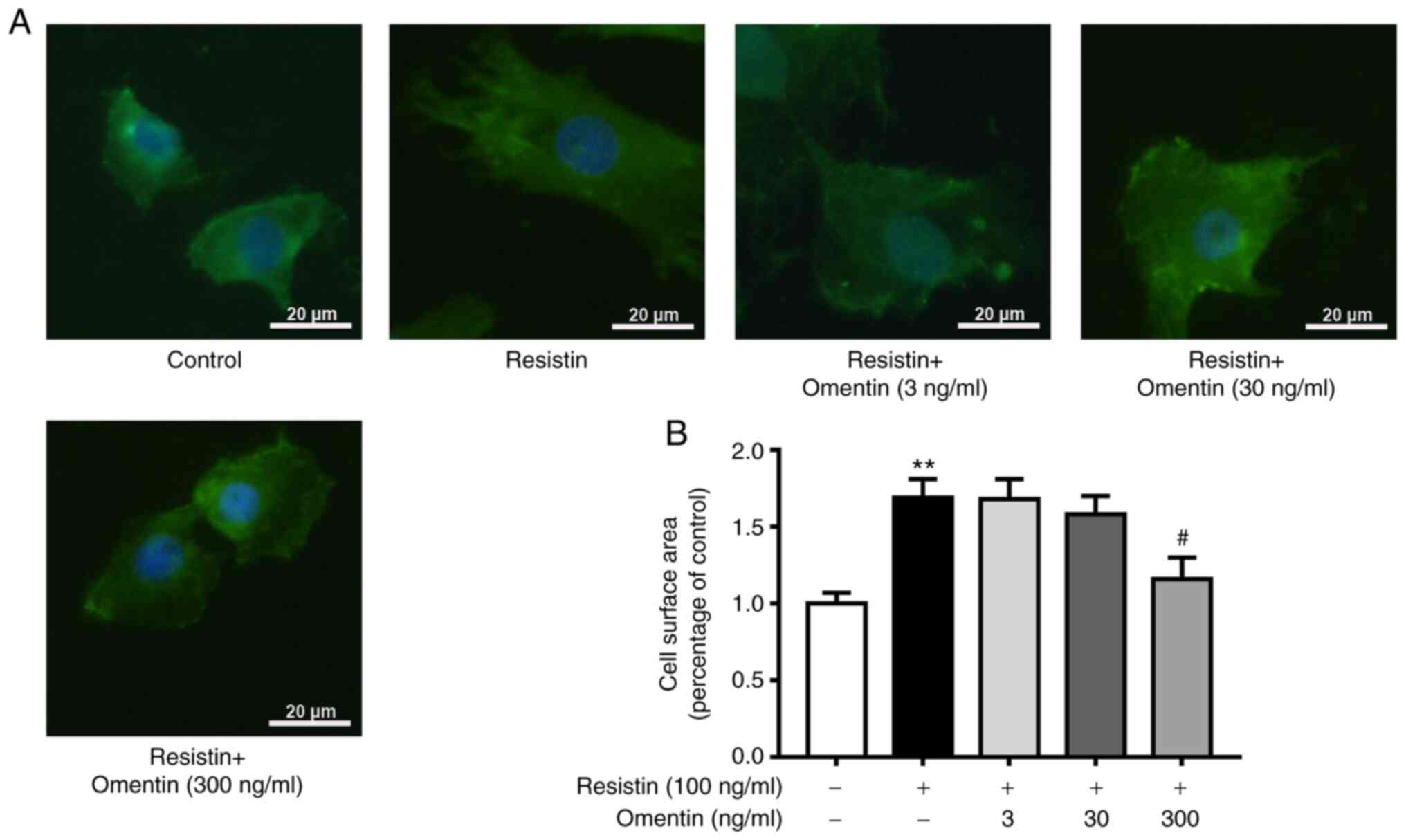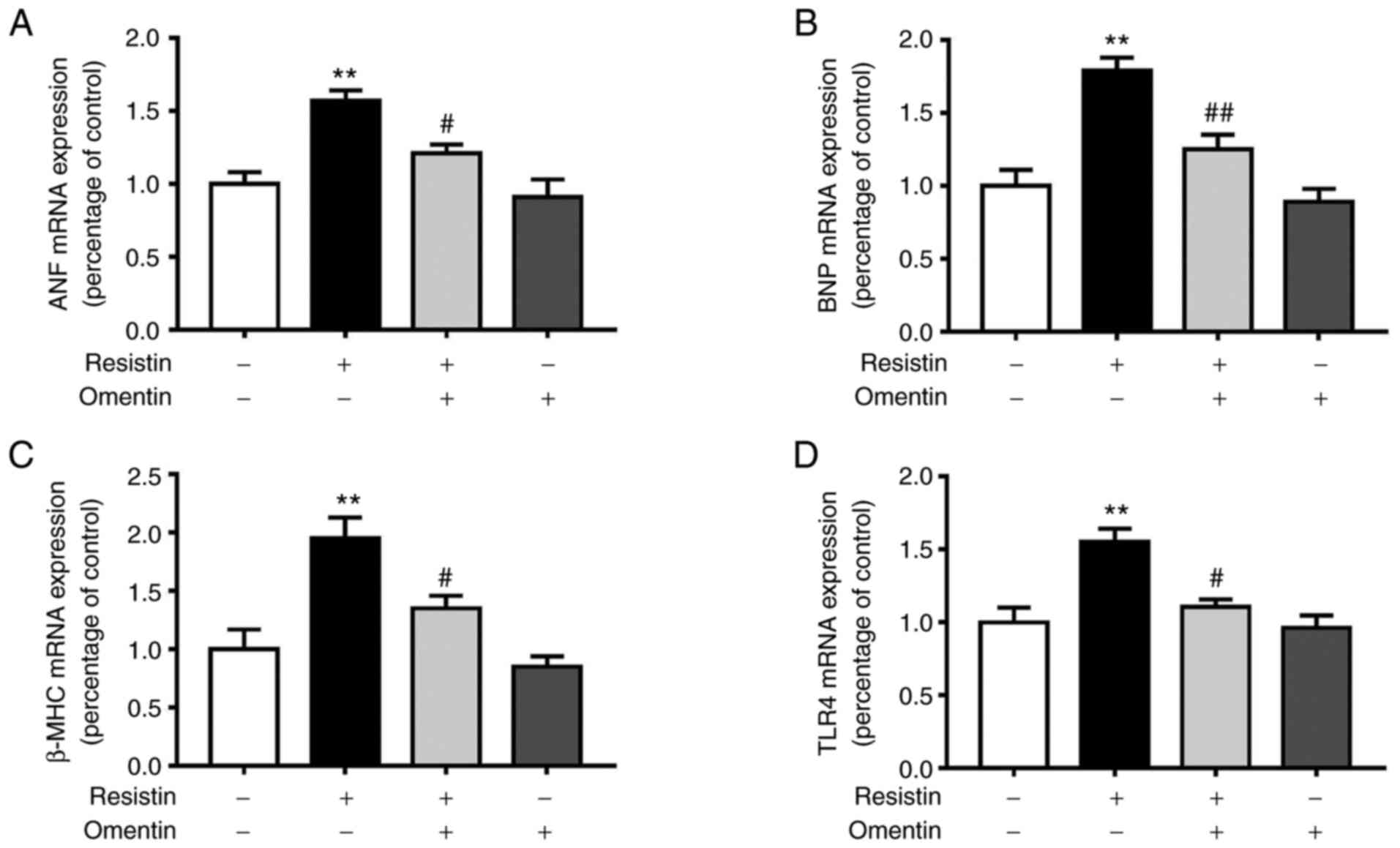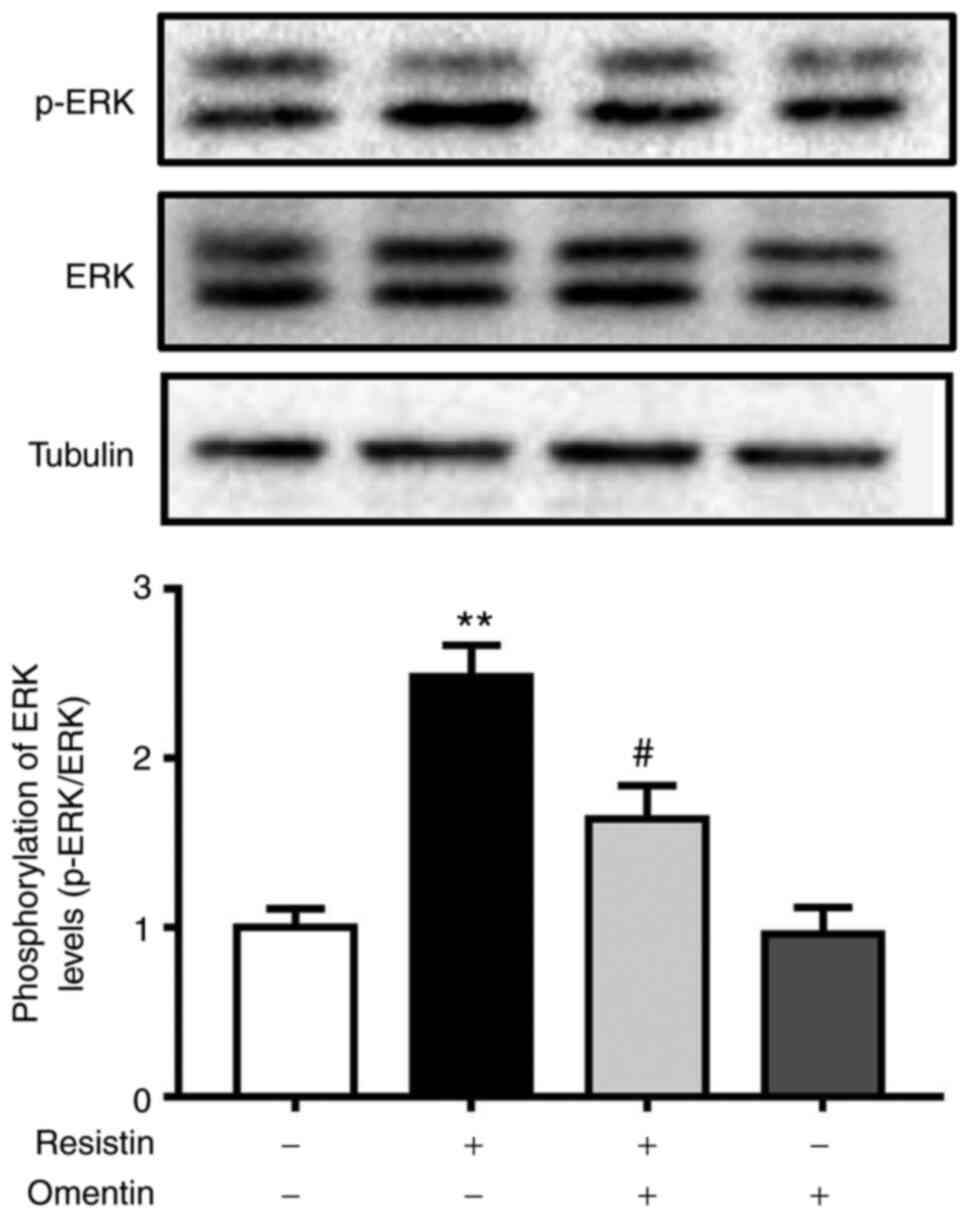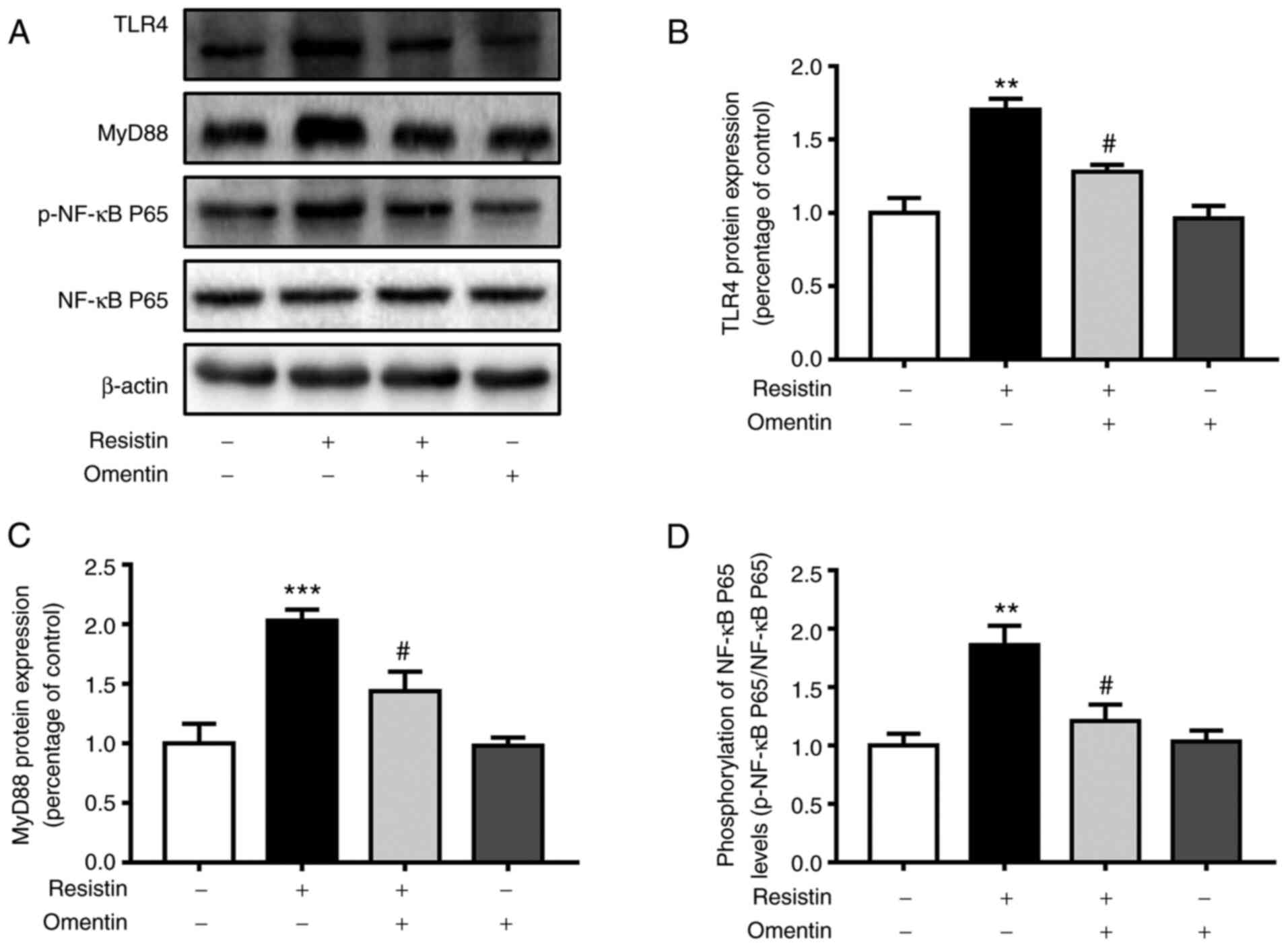|
1
|
Low Wang CC, Hess CN, Hiatt WR and
Goldfine AB: Clinical update: Cardiovascular disease in diabetes
mellitus: Atherosclerotic cardiovascular disease and heart failure
in type 2 diabetes mellitus-mechanisms, management, and clinical
considerations. Circulation. 133:2459–2502. 2016.PubMed/NCBI View Article : Google Scholar
|
|
2
|
Boudina S and Abel ED: Diabetic
cardiomyopathy revisited. Circulation. 115:3213–3223.
2007.PubMed/NCBI View Article : Google Scholar
|
|
3
|
Jia G, Hill MA and Sowers JR: Diabetic
cardiomyopathy: An update of mechanisms contributing to this
clinical entity. Circ Res. 122:624–638. 2018.PubMed/NCBI View Article : Google Scholar
|
|
4
|
Jia G, DeMarco VG and Sowers JR: Insulin
resistance and hyperinsulinaemia in diabetic cardiomyopathy. Nat
Rev Endocrinol. 12:144–153. 2016.PubMed/NCBI View Article : Google Scholar
|
|
5
|
Di Luigi L, Corinaldesi C, Colletti M,
Scolletta S, Antinozzi C, Vannelli GB, Giannetta E, Gianfrilli D,
Isidori AM, Migliaccio S, et al: Phosphodiesterase type 5 inhibitor
sildenafil decreases the proinflammatory chemokine CXCL10 in human
cardiomyocytes and in subjects with diabetic cardiomyopathy.
Inflammation. 39:1238–1252. 2016.PubMed/NCBI View Article : Google Scholar
|
|
6
|
Tan Y, Zhang Z, Zheng C, Wintergerst KA,
Keller BB and Cai L: Mechanisms of diabetic cardiomyopathy and
potential therapeutic strategies: Preclinical and clinical
evidence. Nat Rev Cardiol. 17:585–607. 2020.PubMed/NCBI View Article : Google Scholar
|
|
7
|
Xiao Z, Kong B, Yang H, Dai C, Fang J, Qin
T and Huang H: Key player in cardiac hypertrophy, emphasizing the
role of toll-like receptor 4. Front Cardiovasc Med.
7(579036)2020.PubMed/NCBI View Article : Google Scholar
|
|
8
|
Ma D, Zhang J, Zhang Y, Zhang X, Han X,
Song T, Zhang Y and Chu L: Inhibition of myocardial hypertrophy by
magnesium isoglycyrrhizinate through the TLR4/NF-κB signaling
pathway in mice. Int Immunopharmacol. 55:237–244. 2018.PubMed/NCBI View Article : Google Scholar
|
|
9
|
Gao W, Wang H, Zhang L, Cao Y, Bao JZ, Liu
ZX, Wang LS, Yang Q and Lu X: Retinol-binding protein 4 induces
cardiomyocyte hypertrophy by activating TLR4/MyD88 pathway.
Endocrinology. 157:2282–2293. 2016.PubMed/NCBI View Article : Google Scholar
|
|
10
|
Jamaluddin MS, Weakley SM, Yao Q and Chen
C: Resistin: Functional roles and therapeutic considerations for
cardiovascular disease. Br J Pharmacol. 165:622–632.
2012.PubMed/NCBI View Article : Google Scholar
|
|
11
|
Steppan CM, Bailey ST, Bhat S, Brown EJ,
Banerjee RR, Wright CM, Patel HR, Ahima RS and Lazar MA: The
hormone resistin links obesity to diabetes. Nature. 409:307–312.
2001.PubMed/NCBI View
Article : Google Scholar
|
|
12
|
Gerber M, Boettner A, Seidel B, Lammert A,
Bär J, Schuster E, Thiery J, Kiess W and Kratzsch J: Serum resistin
levels of obese and lean children and adolescents: Biochemical
analysis and clinical relevance. J Clin Endocrinol Metab.
90:4503–4509. 2005.PubMed/NCBI View Article : Google Scholar
|
|
13
|
Pine GM, Batugedara HM and Nair MG: Here,
there and everywhere: Resistin-like molecules in infection,
inflammation, and metabolic disorders. Cytokine. 110:442–451.
2018.PubMed/NCBI View Article : Google Scholar
|
|
14
|
Kim M, Oh JK, Sakata S, Liang I, Park W,
Hajjar RJ and Lebeche D: Role of resistin in cardiac contractility
and hypertrophy. J Mol Cell Cardiol. 45:270–280. 2008.PubMed/NCBI View Article : Google Scholar
|
|
15
|
Jiang Y, Lu L, Hu Y, Li Q, An C, Yu X, Shu
L, Chen A, Niu C, Zhou L and Yang Z: Resistin induces hypertension
and insulin resistance in mice via a TLR4-dependent pathway. Sci
Rep. 6(22193)2016.PubMed/NCBI View Article : Google Scholar
|
|
16
|
Ohmori R, Momiyama Y, Kato R, Taniguchi H,
Ogura M, Ayaori M, Nakamura H and Ohsuzu F: Associations between
serum resistin levels and insulin resistance, inflammation, and
coronary artery disease. J Am Coll Cardiol. 46:379–380.
2005.PubMed/NCBI View Article : Google Scholar
|
|
17
|
Filková M, Haluzík M, Gay S and Senolt L:
The role of resistin as a regulator of inflammation: Implications
for various human pathologies. Clin Immunol. 133:157–170.
2009.PubMed/NCBI View Article : Google Scholar
|
|
18
|
Yang RZ, Lee MJ, Hu H, Pray J, Wu HB,
Hansen BC, Shuldiner AR, Fried SK, McLenithan JC and Gong DW:
Identification of omentin as a novel depot-specific adipokine in
human adipose tissue: Possible role in modulating insulin action.
Am J Physiol Endocrinol Metab. 290:E1253–E1261. 2006.PubMed/NCBI View Article : Google Scholar
|
|
19
|
Yamawaki H, Kuramoto J, Kameshima S, Usui
T, Okada M and Hara Y: Omentin, a novel adipocytokine inhibits
TNF-induced vascular inflammation in human endothelial cells.
Biochem Biophys Res Commun. 408:339–343. 2011.PubMed/NCBI View Article : Google Scholar
|
|
20
|
Watanabe K, Watanabe R, Konii H, Shirai R,
Sato K, Matsuyama TA, Ishibashi-Ueda H, Koba S, Kobayashi Y, Hirano
T and Watanabe T: Counteractive effects of omentin-1 against
atherogenesis†. Cardiovasc Res. 110:118–128. 2016.PubMed/NCBI View Article : Google Scholar
|
|
21
|
Kataoka Y, Shibata R, Ohashi K, Kambara T,
Enomoto T, Uemura Y, Ogura Y, Yuasa D, Matsuo K, Nagata T, et al:
Omentin prevents myocardial ischemic injury through AMP-activated
protein kinase- and Akt-dependent mechanisms. J Am Coll Cardiol.
63:2722–2733. 2014.PubMed/NCBI View Article : Google Scholar
|
|
22
|
Pan HY, Guo L and Li Q: Changes of serum
omentin-1 levels in normal subjects and in patients with impaired
glucose regulation and with newly diagnosed and untreated type 2
diabetes. Diabetes Res Clin Pract. 88:29–33. 2010.PubMed/NCBI View Article : Google Scholar
|
|
23
|
Shibata R, Takahashi R, Kataoka Y, Ohashi
K, Ikeda N, Kihara S, Murohara T and Ouchi N: Association of a
fat-derived plasma protein omentin with carotid artery intima-media
thickness in apparently healthy men. Hypertens Res. 34:1309–1312.
2011.PubMed/NCBI View Article : Google Scholar
|
|
24
|
Zhong X, Zhang HY, Tan H, Zhou Y, Liu FL,
Chen FQ and Shang DY: Association of serum omentin-1 levels with
coronary artery disease. Acta Pharmacol Sin. 32:873–878.
2011.PubMed/NCBI View Article : Google Scholar
|
|
25
|
Luo JW, Zheng X, Cheng GC, Ye QH, Deng YZ
and Wu L: Resistin-induced cardiomyocyte hypertrophy is inhibited
by apelin through the inactivation of extracellular
signal-regulated kinase signaling pathway in H9c2 embryonic rat
cardiomyocytes. Biomed Rep. 5:473–478. 2016.PubMed/NCBI View Article : Google Scholar
|
|
26
|
Ou HC, Lee WJ, Wu CM, Chen JF and Sheu WH:
Aspirin prevents resistin-induced endothelial dysfunction by
modulating AMPK, ROS, and Akt/eNOS signaling. J Vasc Surg.
55:1104–1115. 2012.PubMed/NCBI View Article : Google Scholar
|
|
27
|
Cheleschi S, Gallo I, Barbarino M,
Giannotti S, Mondanelli N, Giordano A, Tenti S and Fioravanti1 A:
MicroRNA mediate visfatin and resistin induction of oxidative
stress in human osteoarthritic synovial fibroblasts Via NF-κB
pathway. Int J Mol Sci. 20(5200)2019.PubMed/NCBI View Article : Google Scholar
|
|
28
|
Matsuo K, Shibata R, Ohashi K, Kambara T,
Uemura Y, Hiramatsu-Ito M, Enomoto T, Yuasa D, Joki Y, Ito M, et
al: Omentin functions to attenuate cardiac hypertrophic response. J
Mol Cell Cardiol. 79:195–202. 2015.PubMed/NCBI View Article : Google Scholar
|
|
29
|
Hardt SE, Tomita H, Katus HA and Sadoshima
J: Phosphorylation of eukaryotic translation initiation factor
2Bepsilon by glycogen synthase kinase-3beta regulates
beta-adrenergic cardiac myocyte hypertrophy. Circ Res. 94:926–935.
2004.PubMed/NCBI View Article : Google Scholar
|
|
30
|
Livak KJ and Schmittgen TD: Analysis of
relative gene expression data using real-time quantitative PCR and
the 2(-Delta Delta C(T)) method. Methods. 25:402–408.
2001.PubMed/NCBI View Article : Google Scholar
|
|
31
|
Sugden PH and Clerk A: Cellular mechanisms
of cardiac hypertrophy. J Mol Med (Berl). 76:725–746.
1998.PubMed/NCBI View Article : Google Scholar
|
|
32
|
Akira S and Takeda K: Toll-like receptor
signaling. Nat Rev Immunol. 4:499–511. 2004.PubMed/NCBI View
Article : Google Scholar
|
|
33
|
Yue TL, Gu JL, Wang C, Reith AD, Lee JC,
Mirabile RC, Kreutz R, Wang Y, Maleeff B, Parsons AA and Ohlstein
EH: Extracellular signal-regulated kinase plays an essential role
in hypertrophic agonists, endothelin-1 and phenylephrine-induced
cardiomyocyte hypertrophy. J Biol Chem. 275:37895–37901.
2000.PubMed/NCBI View Article : Google Scholar
|
|
34
|
Tanaka K, Honda M and Takabatake T: Redox
regulation of MAPK pathways and cardiac hypertrophy in adult rat
cardiac myocyte. J Am Coll Cardiol. 37:676–685. 2001.PubMed/NCBI View Article : Google Scholar
|
|
35
|
Lundberg AM, Ketelhuth DF, Johansson ME,
Gerdes N, Liu S, Yamamoto M, Akira S and Hansson GK: Toll-like
receptor 3 and 4 signalling through the TRIF and TRAM adaptors in
haematopoietic cells promotes atherosclerosis. Cardiovasc Res.
99:364–373. 2013.PubMed/NCBI View Article : Google Scholar
|
|
36
|
Molteni M, Gemma S and Rossetti C: The
role of toll-like receptor 4 in infectious and noninfectious
inflammation. Mediators Inflamm. 2016(6978936)2016.PubMed/NCBI View Article : Google Scholar
|
|
37
|
Chimenti C, Verardo R, Scopelliti F,
Grande C, Petrosillo N, Piselli P, De Paulis R and Frustaci A:
Myocardial expression of Toll-like receptor 4 predicts the response
to immunosuppressive therapy in patients with virus-negative
chronic inflammatory cardiomyopathy. Eur J Heart Fail. 19:915–925.
2017.PubMed/NCBI View Article : Google Scholar
|
|
38
|
Soraya H, Clanachan AS, Rameshrad M,
Maleki-Dizaji N, Ghazi-Khansari M and Garjani A: Chronic treatment
with metformin suppresses toll-like receptor 4 signaling and
attenuates left ventricular dysfunction following myocardial
infarction. Eur J Pharmacol. 737:77–84. 2014.PubMed/NCBI View Article : Google Scholar
|
|
39
|
Lu M, Tang F, Zhang J, Luan A, Mei M, Xu
C, Zhang S, Wang H and Maslov LN: Astragaloside IV attenuates
injury caused by myocardial ischemia/reperfusion in rats via
regulation of toll-like receptor 4/nuclear factor-κB signaling
pathway. Phytother Res. 29:599–606. 2015.PubMed/NCBI View Article : Google Scholar
|
|
40
|
Zhang J, Zhang J, Yu P, Chen M, Peng Q,
Wang Z and Dong N: Remote ischaemic preconditioning and sevoflurane
postconditioning synergistically protect rats from myocardial
injury induced by ischemia and reperfusion partly via inhibition
TLR4/MyD88/NF-κB signaling pathway. Cell Physiol Biochem. 41:22–32.
2017.PubMed/NCBI View Article : Google Scholar
|
|
41
|
Ma SR and Xie XW: NLRC5 deficiency
promotes myocardial damage induced by high fat diet in mice through
activating TLR4/NF-κB. Biomed Pharmacother. 91:755–766.
2017.PubMed/NCBI View Article : Google Scholar
|
|
42
|
Silswal N, Singh AK, Aruna B, Mukhopadhyay
S, Ghosh S and Ehtesham NZ: Human resistin stimulates the
pro-inflammatory cytokines TNF-alpha and IL-12 in macrophages by
NF-kappaB-dependent pathway. Biochem Biophys Res Commun.
334:1092–1101. 2005.PubMed/NCBI View Article : Google Scholar
|
|
43
|
Tarkowski A, Bjersing J, Shestakov A and
Bokarewa MI: Resistin competes with lipopolysaccharide for binding
to toll-like receptor 4. J Cell Mol Med. 14:1419–1431.
2010.PubMed/NCBI View Article : Google Scholar
|
|
44
|
Kang YJ: Cardiac hypertrophy: A risk
factor for QT-prolongation and cardiac sudden death. Toxicol
Pathol. 34:58–66. 2006.PubMed/NCBI View Article : Google Scholar
|
|
45
|
Han J, Ye S, Zou C, Chen T, Wang J, Li J,
Jiang L, Xu J, Huang W, Wang Y and Liang G: Angiotensin II causes
biphasic STAT3 activation through TLR4 to initiate cardiac
remodeling. Hypertension. 72:1301–1311. 2018.PubMed/NCBI View Article : Google Scholar
|
|
46
|
Ehrentraut H, Weber C, Ehrentraut S,
Schwederski M, Boehm O, Knuefermann P, Meyer R and Baumgarten G:
The toll-like receptor 4-antagonist eritoran reduces murine cardiac
hypertrophy. Eur J Heart Fail. 13:602–610. 2011.PubMed/NCBI View Article : Google Scholar
|
|
47
|
Smeets PJ, Teunissen BE, Planavila A, de
Vogel-van den Bosch H, Willemsen PH, van der Vusse GJ and van
Bilsen M: Inflammatory pathways are activated during cardiomyocyte
hypertrophy and attenuated by peroxisome proliferator-activated
receptors PPARalpha and PPARdelta. J Biol Chem. 283:29109–29118.
2008.PubMed/NCBI View Article : Google Scholar
|
|
48
|
Gupta S, Young D, Maitra RK, Gupta A,
Popovic ZB, Yong SL, Mahajan A, Wang Q and Sen S: Prevention of
cardiac hypertrophy and heart failure by silencing of NF-kappaB. J
Mol Biol. 375:637–649. 2008.PubMed/NCBI View Article : Google Scholar
|
|
49
|
Tan BK, Adya R and Randeva HS: Omentin: A
novel link between inflammation, diabesity, and cardiovascular
disease. Trends Cardiovasc Med. 20:143–148. 2010.PubMed/NCBI View Article : Google Scholar
|
|
50
|
Rao SS, Hu Y, Xie PL, Cao J, Wang ZX, Liu
JH, Yin H, Huang J, Tan YJ, Luo J, et al: Omentin-1 prevents
inflammation-induced osteoporosis by downregulating the
pro-inflammatory cytokines. Bone Res. 6(9)2018.PubMed/NCBI View Article : Google Scholar
|
|
51
|
Yoo HJ, Hwang SY, Hong HC, Choi HY, Yang
SJ, Seo JA, Kim SG, Kim NH, Choi KM, Choi DS and Baik SH:
Association of circulating omentin-1 level with arterial stiffness
and carotid plaque in type 2 diabetes. Cardiovasc Diabetol.
10(103)2011.PubMed/NCBI View Article : Google Scholar
|
|
52
|
Genre F, Rueda-Gotor J, Remuzgo-Martínez
S, Pulito-Cueto V, Corrales A, Mijares V, Lera-Gómez L, Portilla V,
Expósito R, Mata C, et al: Omentin: A biomarker of cardiovascular
risk in individuals with axial spondyloarthritis. Sci Rep.
10(9636)2020.PubMed/NCBI View Article : Google Scholar
|
|
53
|
Zhou JP, Tong XY, Zhu LP, Luo JM, Luo Y,
Bai YP, Li CC and Zhang GG: Plasma omentin-1 level as a predictor
of good coronary collateral circulation. J Atheroscler Thromb.
24:940–948. 2017.PubMed/NCBI View Article : Google Scholar
|


















